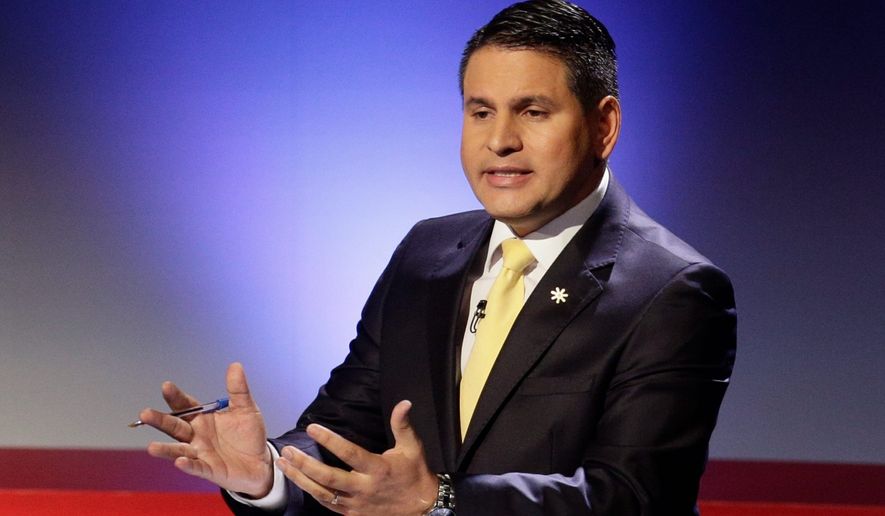OPINION:
Costa Rica, proclaimed National Geographic magazine only last year, is “the happiest country in the world.” It’s certainly one of the most stable, but there’s more. “Costa Ricans enjoy the pleasure of living daily life to the fullest in a place that mitigates stress and maximizes joy.”
No wonder, then, that the first round of the presidential election in Costa Rica last Sunday winnowed a 13-candidate field to two, and they both have the same name. (Talk about national unity.) They will vie in a run-off election on April Fool’s Day. (Talk about the irony of goodwill.) One of them will have to lose, apparently a very un-Costa Rican thing to do.
But what makes life interesting, even in “a place that mitigates stress and maximizes joy,” is friendly conflict, and Fabricio Alvarado, who finished first in the first round of the election, promises that Costa Rica will not legalize same-sex marriage, and Carlos Alvarado, is eager to enable husbands and husbands, and wives and wives, to tie the knot just like husbands and wives do.
Same-sex marriage emerged front and center in the Costa Rican presidential election campaign after seven judges of the Inter-American Court of Human Rights in early January urged the 20 member nations that haven’t already done so to legalize such nuptials. The decree of the court, an arm of the Organization of American States, is not actually binding on anyone. Of the 20 Latin American and Caribbean island nations that have accepted the jurisdiction of the Inter-American Court of Human Rights, only Argentina, Brazil, Colombia and Uruguay, along with several jurisdictions in Mexico), have signed on to what the LGBT lobby calls “marriage equality.”
Fabricio Alvarado, 43, catapulted from an also-ran candidate to front-runner after he came out strongly against the court’s decree and finished with 24.9 percent of the vote. Carlos Alvarado, 38, the only major candidate openly supporting legalizing same-sex unions, drew 21.6 percent. Neither was close to the 40 percent required to win on the first ballot. A survey by the University of Costa Rica’s Center for Research in Political Sciences released Jan. 31 found that just under 70 percent of those polled oppose the court’s decision, which further urged that “gender identity” be designated a protected category for nondiscrimination. Nearly 80 percent of Costa Ricans are Roman Catholics, and 14 percent are evangelical Protestants, most of whom take their church’s teachings seriously.
Fabricio Alvarado, a former television newsreader, sometime preacher and frequent church singer, calls the court’s decree a “sovereign violation” and an “external imposition.” He suggests that if he is elected he might withdraw Costa Rica from the court’s jurisdiction. Costa Rica, he says, “has made it clear to the traditional politicians, never again mess with the family. Never again mess with our children.”
This was generally taken as a rebuke of the incumbent president, Luis Guillermo Solis, who supports LGBT advocacy and once ordered the rainbow flag celebrating various homosexual aims to fly over the presidential palace in recognition of the International Day Against Homophobia and Transphobia.
“There’s nothing more progressive than defending life and family,” Fabricio Alvarado said on election day, doubling down the next day with a vow that no member of his Cabinet would support same-sex marriage or abortion. The platform of his National Restoration Party pledges that “all vestiges of gender ideology will be eliminated from public policy in Costa Rica.” There’s no playing to the mushy middle in San Jose.
The other Alvarado, Carlos Alvarado, 38, a novelist and onetime singer in a rock band, was an officer of the Citizens Action Party and labor secretary in the incumbent president’s administration. He supports the Inter-American Court’s ruling on marriage and speaks fluent mush. “The Costa Rica of the 21st century needs a government that knows how to advance with strength, love and happiness, the agenda of equality,” he says.
Fabricio Alvarado’s success has alarmed the gay rights lobby everywhere. “The country’s anti-rights forces came together,” Margarita Salas, a Costa Rican LGBT rights activist, tells the Washington Blade, a newspaper widely read among gays in America. “These results are undoubtedly a blow to the advance of human rights.”
But read another way, Fabricio Alvarado’s first-round triumph, which included winning 14 legislative seats against only one held previously, is a pushback against raw judicial activism and the elitist cultural liberalism trying to force radical change on a resisting Costa Rican population. If it’s “the happiest country in the world,” why turn everything upside down?




Please read our comment policy before commenting.